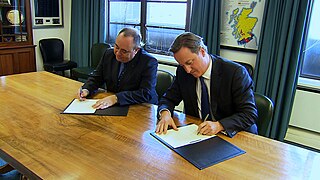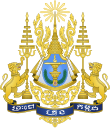
A referendum, plebiscite, or ballot measure is a direct vote by the electorate on a proposal, law, or political issue. A referendum may be either binding or advisory.
National referendums are seldom used in Canada. The first two referendums in 1898 and 1942 saw a large number of voters in Quebec and in the remainder of Canada take dramatically-opposing stands, and the third in 1992 saw most of the voters take a stand opposed to that of the party in power.
A consultative referendum was held in Taiwan on 20 March 2004 to coincide with the 2004 presidential elections. Voters were asked two questions regarding the cross-strait relations, that is, between Taiwan and China. The initiation of this referendum by President Chen Shui-bian came under intense criticism from China because it was seen as an exercise for an eventual vote on Taiwanese independence. The Pan-Blue Coalition urged a boycott, citing that the referendum was illegal and unnecessary.

Referendums in the United Kingdom are occasionally held at a national, regional or local level. Historically, national referendums are rare due to the long-standing principle of parliamentary sovereignty. Legally there is no constitutional requirement to hold a national referendum for any purpose or on any issue. However, the UK Parliament is free to legislate through an Act of Parliament for a referendum to be held on any question at any time.

The Scottish devolution referendum of 1997 was a pre-legislative referendum held in Scotland on 11 September 1997 over whether there was support for the creation of a Scottish Parliament with devolved powers, and whether the Parliament should have tax-varying powers. The result was "Yes–Yes": a majority voted in favour of both proposals, and the Parliament was established following an election in 1999. Turnout for the referendum was 60.4%.

Elections in Benin take place within the framework of a multi-party democracy and a presidential system. Both the President and the National Assembly are directly elected by voters, with elections organised by the Autonomous National Electoral Commission (CENA).

Bulgaria elects a head of state—the president—and a legislature on a national level. The president is elected for a five-year term by the people directly. The National Assembly has 240 members elected for a four-year term by proportional representation in multi-seat constituencies with a 4% threshold. Bulgaria has a multi-party system in which usually no party receives a required majority and parties have to collaborate to form governments, generally via confidence and supply or coalition agreements.

The prime minister of Cambodia is the head of government of Cambodia. The prime minister is also the chairman of the Cabinet and leads the executive branch of the Royal Government of Cambodia. The prime minister is a member of parliament, and is appointed by the monarch for a term of five years. Since 1945, 37 individuals have served as prime minister; 33 as official prime ministers, and 4 in acting capacities. The current prime minister since 2023 is Hun Manet.

An independence referendum is a type of referendum in which the residents of a territory decide whether the territory should become an independent sovereign state. An independence referendum that results in a vote for independence does not always ultimately result in independence.

A referendum on the future of the Soviet Union was held on 17 March 1991 across the Soviet Union. It was the only national referendum in the history of the Soviet Union, although it was boycotted by authorities in six of the fifteen Soviet republics.
The 2009–2011 Catalan independence referendums, a series of non-binding and unofficial referendums, "popular votes", took place in municipalities around Catalonia. In them voters indicated whether they supported Catalan independence from Spain. The first such referendum took place in Arenys de Munt on 13 September 2009: there followed votes in Sant Jaume de Frontanyà on 12 December and in 166 other municipalities on 13 December. Another vote ensued in April 2011 in Barcelona.

A referendum on the monarchy was held in Rwanda on 25 September 1961, concurrent with parliamentary elections. The referendum asked two questions: whether the monarchy should be retained after independence the following year, and whether the incumbent, Kigeli V, should remain King.
A referendum on the political status of Puerto Rico was held in Puerto Rico on November 6, 2012. It was the fourth referendum on status to be held in Puerto Rico. Puerto Rico has been an unincorporated territory of the United States since the Spanish–American War in 1898.
Five referendums were held in Switzerland in 1891. The first was held on 15 March on a federal law on federal officials who had become unemployable due to disability, and was rejected by 79.4% of voters. The second was held on 5 July on a constitutional amendment, and was approved by 60.3% of voters. Two referendums were held on 18 October, one on revising article 39 of the federal constitution and one on a federal law on Swiss tariffs; both were approved. The last was held on 6 December on the question of whether the federal government should purchase the Swiss Central Railway, but was rejected by 68.9% of voters.

The Edinburgh Agreement is the agreement between the Scottish Government and the United Kingdom Government, signed on 15 October 2012 at St Andrew's House, Edinburgh, on the terms for the 2014 Scottish independence referendum.
A referendum is a direct vote in which an entire electorate is asked to either accept or reject a particular proposal. This article summarises referendum laws and practice in various countries.
This page lists the public opinion polls that were conducted in relation to the 2014 Scottish independence referendum, that was held on 18 September 2014. Overall, polls showed that support for a "No" vote was dominant until the end of August 2014, when support for a "Yes" vote gained momentum and the gap closed significantly, with at least one poll placing the "Yes" vote ahead. In the final week of the campaign, polls showed the "No" vote to be consistently but somewhat narrowly ahead. There were no exit polls although a YouGov post-election poll was published shortly after the polls closed. For the history of the campaign itself see 2014 Scottish independence referendum, Yes Scotland, and Better Together (campaign).
Opinion polling on Scottish independence is continually being carried out by various organisations. This article concerns the nearly 300 polls carried out since the 2014 Scottish independence referendum. Polling conducted before the referendum can be found here. Polls listed here, except as noted, are by members of the British Polling Council (BPC) and abide by its disclosure rules.

A non-binding independence referendum was held in Bougainville, an autonomous region of Papua New Guinea, between 23 November and 7 December 2019. The referendum question presented a choice between greater autonomy within Papua New Guinea and full independence; voters voted overwhelmingly (98.31%) for independence.

An independence referendum was held in New Caledonia on 4 October 2020. The poll was the second to be held under the terms of the Nouméa Accord, following a similar referendum in 2018.













